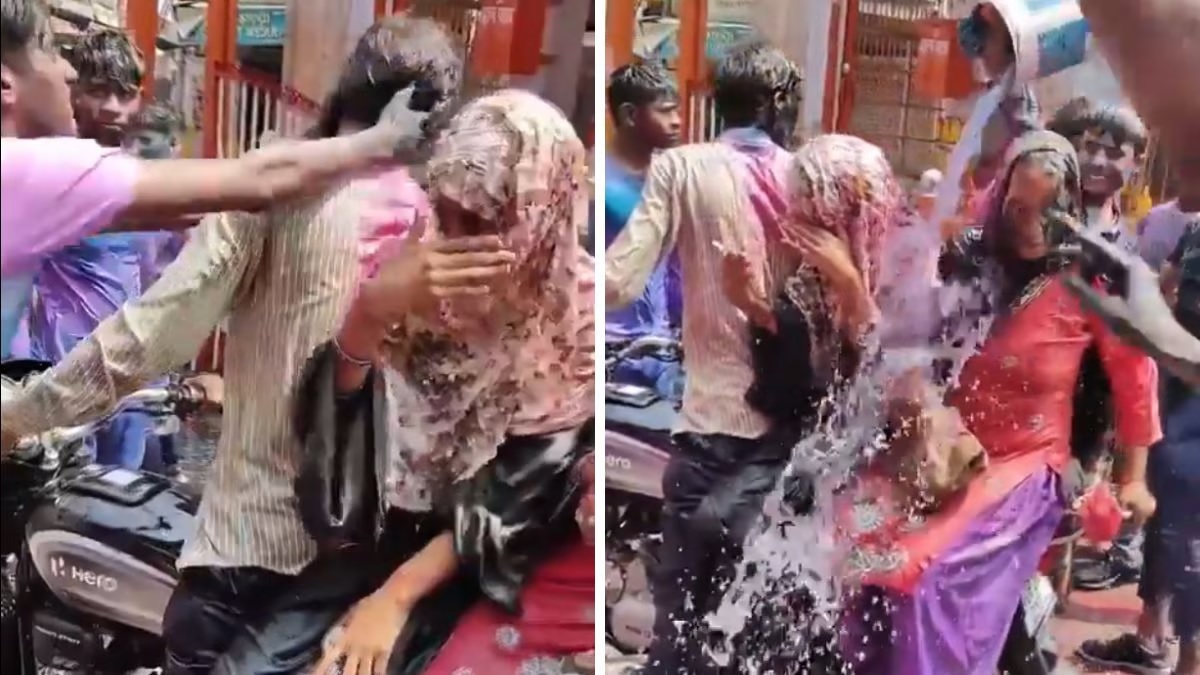The incident has gone viral and has sparked outrage on social media. The viral footage shows a group of men forcefully applying colours and throwing water on a family as they were riding on a motorcycle through the Dhampur area of Bijnor on March 20. The victims consisted of a Muslim man and two women, who were harassed by men carrying buckets of water and colours. Despite the family’s pleas to stop, the perpetrators continued their aggressive behaviour, and also shouted chants of ‘Jai Shri Ram’ and ‘Har Har Mahadev.’
In response to the incident, the Bijnor Police have launched an investigation, which has led to the arrest of one person, named Aniruddha, and the detention of others, which consists of three juveniles. Charges have been filed under various sections of the IPC and CrPC, including wrongful restraint, causing hurt, and assaulting a woman. Senior Superintendent of Police (SSP) Neeraj Jaduan, in a video statement, assured that the police are trying their best to identify the perpetrators with the help of CCTV footage.
SSP Neeraj Jaduan, in the released video statement, also went ahead and talked about the need to celebrate the festival in peace, urging people not to engage in any form of harassment during Holi celebrations, “Please do not forcibly apply colours on people. Police will take action against anyone who breaks the law.” He has also directed the Circle Officer (CO) of Dhampur to personally assist the affected family in filing a complaint and assured the public that the investigation would be conducted under his supervision.
#BijnorPolice
थाना धामपुर क्षेत्र से संबंधित सोशल मीडिया पर वायरल वीडियो के संबंध में स्थानीय पुलिस द्वारा की जा रही वैधानिक कार्यवाही के संबंध में पुलिस अधीक्षक, जनपद बिजनौर की बाइट ।
#UPPolice pic.twitter.com/TBPpgVTIvY— Bijnor Police (@bijnorpolice) March 24, 2024
A complaint was filed by the family following the identification of the victims by the police. So far, the accused involved in the incident have been charged by the police under several sections of the Indian Penal Code (IPC), including Section 153A for promoting enmity between different groups based on religion, race, place of birth, etc., Section 340 for wrongful restraint, and Section 354 for the use of criminal force against a woman with the intention to outrage her modesty or with the knowledge that such actions are likely to do so.
Meanwhile, Maktoob Media has reported that the attackers can be heard shouting, in the viral video, that “This is a 70 years old tradition!”
Filmmaker Darab Faruqui called the incident an example of rape culture. In his post on the disturbing incident, Faruqi breaks down the incident bit by bit, highlighting the chants such as ‘Jai Shri Ram’ and ‘Har Har Mahadev’ and the body language of the victims featured in the video.
Trigger Warning:
This video is deeply disturbing since it depicts sexual harassment on video. The video is apparently from Bijnor, UP.
Before I proceed, let me point out a few observations.
1. Chanting of ‘Jai Shri Ram’ and “Har Har Mahadev”
2. The Hooligans’ bullying and… pic.twitter.com/XYDomjMl4K— Darab Farooqui (@darab_farooqui) March 24, 2024
It has been often noted how harassment often becomes normalised during Holi. It is often done saying “Bura na mano Holi hai” (Do not mind, it’s Holi). This phrase has been used to downplay or excuse instances of harassment and assault and often led to a culture where such misconduct is silently accepted and excused.
In 2023, the incident related to a 22-year-old Japanese woman named Megumi went viral. She was harassed and molested by a group of men on the streets of Delhi during the Holi celebration. She shared a video of the incident on Twitter, narrating the details, only to delete it shortly afterward, and said that she was in fear and terror as she was heavily trolled on her video. So not only was a woman harassed and violated, but she was also trolled and bullied after she spoke about it online.
Similarly, in 1996, the Gender Study Group at Delhi University released a report highlighting how instances of sexual harassment and assault increased during Holi festivities. The report revealed that about 60.5% of women residing on the campus that year in Delhi reported experiencing increased levels of harassment around this time. This persistent nature of gendered violence and violation under the guise of celebration affects women across religion, culture, and, as seen in the case of Megumi, nationality and race, too. This reality brings our attention to the urgent need for efforts to ensure efficient functioning of legal and also to ensure proactive initiatives to tackle parts of cultures that normalise violating women’s consent.
Related:
Sharp increase in violence against Christians, 161 incidents of violence in 75 days of 2024
As the date for the general assembly election approaches, hate crimes in India continue
